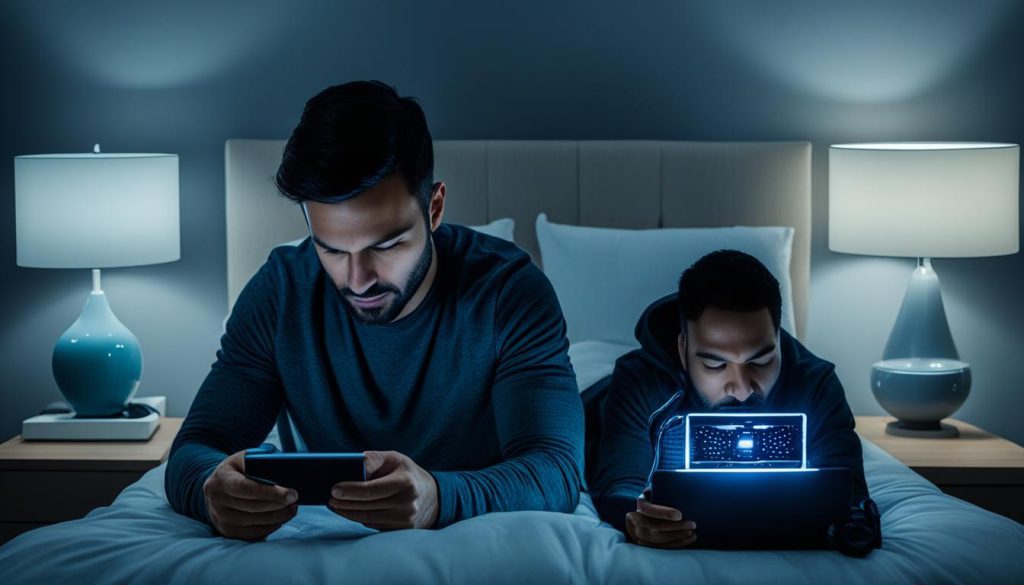Are you struggling to sleep at night? Lack of sleep can have serious consequences on your health and well-being. From an increased risk of heart disease to impairing cognitive function, sleep deprivation is something we should all take seriously.
If you’re looking to improve your sleep quality and wake up feeling refreshed, I’ve put together 10 tips that can help you achieve a better night’s rest. From establishing a sleep routine to avoiding technology before bed, these tips are easy to implement and can make a world of difference in improving your sleep patterns.
Whether you suffer from occasional sleepless nights or chronic insomnia, these natural sleep remedies and healthy sleep habits can help you get the rest you deserve. So, let’s dive in and explore the tips that will transform your nights and leave you feeling rejuvenated each morning.
Tips to Sleep Better
- Establish a sleep routine to program your body’s sleep patterns.
- Create a soothing setting to help you relax before bedtime.
- Avoid technology for at least an hour before bed to promote better sleep.
- Eat foods rich in tryptophan and serotonin to promote melatonin production.
- Avoid heavy meals, caffeine, and alcohol, as they can negatively impact sleep quality.
Improving your sleep quality is within your reach. By incorporating these tips into your daily routine, you can experience the benefits of better sleep. Remember, consistency is key, so give yourself time to adjust and see the positive impact on your overall well-being.
Take Time to Relax
To combat stress-induced sleep problems, it’s vital to take the time to relax before bedtime. A relaxation routine can greatly reduce stress and help create a soothing setting that promotes better sleep. Here are some effective strategies for coping with stress and preparing your mind and body for a restful night:
1. Take a Warm Bath
Indulging in a warm bath before bed can help relax your muscles and calm your mind. Add some Epsom salts or essential oils like lavender to enhance the relaxation experience. The warm water will soothe your body and promote a sense of calmness, making it easier to fall asleep.
2. Read a Book
Reading a book before bed is an excellent way to unwind and transition into a state of relaxation. Choose a genre that you find enjoyable and try to avoid stimulating or suspenseful stories that may keep your mind racing. Opt for a physical book instead of an e-reader to minimize exposure to blue light.
3. Listen to Soothing Music
Music has a profound impact on our emotions and can help create a peaceful atmosphere. Choose soft, instrumental songs or nature sounds that promote a sense of tranquility. Create a calming playlist dedicated to your pre-sleep routine and let the soothing melodies guide you into a restful slumber.
4. Write a To-Do List
If you often find your mind consumed with thoughts of unfinished tasks or future obligations, writing a to-do list before bed can help alleviate anxiety. Jot down everything you need to do the next day so that your mind can rest easy, knowing that you have a plan in place.
5. Create a Relaxing Environment
Your bedroom should be a sanctuary of relaxation. Set the right temperature, ensuring it’s not too hot or too cold. Invest in a comfortable mattress, pillows, and bedding that promote a good night’s sleep. Incorporate pleasant smells, like lavender or chamomile scents, to create a soothing atmosphere that signals your body it’s time to wind down.
By incorporating these relaxation techniques into your evening routine, you can reduce stress-induced sleep problems and create a more peaceful and conducive environment for a restful night’s sleep.
Establish a Sleep Routine
Just like babies and children, adults can benefit from having a sleep routine. Going to bed at a consistent time allows the body to program itself to naturally fall asleep and wake up at certain times. This helps establish a healthy sleep pattern and promotes a more restful night’s sleep.
To establish a sleep routine, it’s important to set a regular bedtime and wake-up time that aligns with your natural sleep and wake-up times. This helps regulate your body’s internal clock and promotes better sleep quality. Stick to your routine even on weekends to maintain a consistent sleep schedule.

In addition to establishing a consistent sleep schedule, creating a sleep-inducing environment can further enhance your sleep quality. Keep your bedroom dark, quiet, and at a comfortable temperature. Use blackout curtains or an eye mask to block out light, and wear earplugs or use a white noise machine to minimize noise disturbances. Investing in a comfortable mattress, pillows, and bedding can also contribute to a relaxing sleep environment.
A bedtime routine can also signal to your body that it’s time to wind down and prepare for sleep. Incorporate relaxing activities such as reading a book, practicing gentle stretches or yoga, or taking a warm bath or shower before bed. Avoid stimulating activities or electronics that emit blue light, as it can interfere with your body’s production of melatonin, the sleep hormone.
By establishing a sleep routine and creating a sleep-inducing environment, you can program your body’s sleep patterns and promote natural, restful sleep. Stick to your routine consistently and make it a priority for better sleep quality and overall well-being.
Minimize Technology Use
When it comes to promoting better sleep, one of the key factors to consider is the use of technology before bed. Nowadays, it’s common for people to spend their evenings scrolling through their smartphones, watching TV shows, or working on their computers right up until bedtime.
However, these technological devices emit blue light, which can have a negative impact on our sleep. Blue light exposure has been found to suppress the production of melatonin, the hormone that regulates sleep and wakefulness. This can result in difficulties falling asleep and lower sleep quality overall.
To promote better sleep, it’s important to avoid using technology at least an hour before bed. This means setting a designated time to disconnect from our devices and engage in activities that relax the mind and prepare the body for sleep.
Banishing technological devices from the bedroom is also crucial. The bedroom should be a technology-free environment, free from the distractions and stimulating effects of screens and notifications.
Creating a technology-free bedroom not only helps to minimize blue light exposure but also promotes a conducive sleep environment. By removing these distractions, we can focus on winding down, allowing our bodies to fully relax and prepare for sleep.
To visualize the importance of minimizing technology use before bed and its impact on sleep, take a look at the image below:

Healthy Eating Habits for Better Sleep
Eating a healthy diet plays a crucial role in improving sleep quality. Certain foods can aid in promoting a good night’s rest by helping the body produce more melatonin, the hormone that regulates sleep-wake cycles. One essential component for melatonin production is tryptophan, an amino acid found in various foods.
Foods rich in tryptophan include milk, chicken, turkey, and pumpkin seeds. Incorporating these into your diet can enhance the production of serotonin, a neurotransmitter that converts into melatonin. By including these sleep-promoting foods in your meals, you can support a more restful night’s sleep.
Conversely, certain foods should be avoided to maintain optimal sleep quality. Heavy meals, especially close to bedtime, can cause discomfort and lead to disrupted sleep. Spicy foods and large amounts of sugar can also interfere with sleep patterns, making it harder to fall asleep and stay asleep throughout the night.
Additionally, it’s crucial to be mindful of consuming caffeine, especially in the afternoon and evening. Caffeinated drinks like coffee, tea, and soda can stimulate the nervous system and make it difficult to wind down before bed. To ensure a peaceful night’s rest, it’s best to avoid or limit caffeine intake in the hours leading up to sleep.
FAQ
How can I improve my sleep quality?
There are several things you can do to improve your sleep quality. Some tips include establishing a relaxing bedtime routine, creating a sleep-inducing environment, avoiding technology before bed, and maintaining healthy eating habits. These practices can help promote better sleep and ensure a restful night.
How does relaxation before bedtime help with sleep?
Taking the time to relax before bed can help reduce stress-induced sleep problems. Activities such as taking a warm bath, reading a book, or listening to soothing music can help your mind and body unwind. Writing a to-do list before bed can also help clear your mind of any worries or tasks, allowing you to relax and prepare for sleep.
Why is it important to establish a sleep routine?
Having a consistent sleep routine can help program your body’s natural sleep and wake-up times. Going to bed at the same time every night trains your body to fall asleep and wake up more easily. Creating a sleep-inducing environment and following a bedtime routine, such as reading or practicing relaxation techniques, can help signal to your body that it’s time to wind down and prepare for sleep.
How does minimizing technology use before bed help with sleep?
Using smartphones, computers, and TVs before bed exposes you to blue light, which can suppress the production of melatonin, the sleep hormone. Avoiding technology for at least an hour before bed and keeping these devices out of your bedroom can help promote better sleep. Creating a technology-free environment in the bedroom allows your body to naturally produce melatonin and prepares you for a restful night’s sleep.
Can my eating habits affect my sleep quality?
Yes, what you eat can impact your sleep quality. Including foods rich in tryptophan and serotonin, such as milk, chicken, turkey, and pumpkin seeds, can promote the production of melatonin, the sleep hormone. On the other hand, it’s important to avoid spicy food, alcohol, large meals, and sugary foods, as they can disrupt sleep. Additionally, it’s best to avoid caffeine, especially in the afternoon, as it can interfere with your ability to fall asleep.




